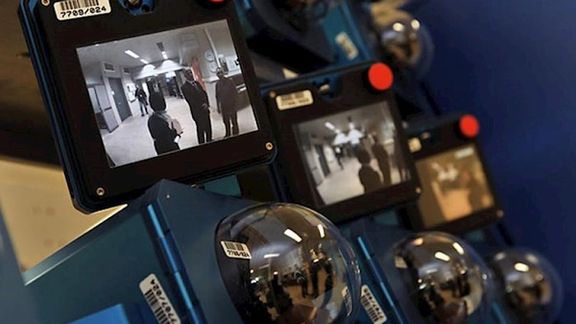Iran Says IAEA Camera To Be Replaced After 'Meticulous Examination'

Iran’s atomic energy spokesman said Thursday that Tehran and the IAEA had agreed to reinstall cameras at the Karaj plant after examination by Iranian experts.

Iran’s atomic energy spokesman said Thursday that Tehran and the IAEA had agreed to reinstall cameras at the Karaj plant after examination by Iranian experts.
Behrouz Kamalvandi,of the Atomic Energy Organization of Iran (AEOI), said staff from the International Atomic Energy Agency would “answer the technical questions of our security and safety experts… [and that] after careful and necessary checks, the agency’s cameras will be re-installed.”
An IAEA statement Wednesday said surveillance cameras removed from the facility would be back in place in coming days.
The Karaj plant, which makes components for the Iranian nuclear program, was in June hit by a drone strike, widely attributed to Israel. Months later Tehran said it suspected security breaches and refused to allow the replacement of surveillance cameras damaged in the attack, complicating talks between Tehran and the IAEA over an already delicate temporary access arrangement agreed in February.
Kamalvandi noted that, according to the usual protocols, Iran would not open the cameras without IAEA consent. He said footage would be sealed jointly by Iran and the IAEA.
Under a law passed in Iran in December 2020, the Iranian authorities will not allow the agency access to the footage until Tehran resumes applying its Additional Protocol, which allowed greater IAEA access to Iranian nuclear sites.
Such access was required under the 2015 nuclear deal, which talks in Vienna between Iran and world powers are seeking to revive after the United States in 2018 left the agreement, the JCPOA (Joint Comprehensive Plan of Action), and imposed ‘maximum pressure’ sanctions.
‘Preventing excuses’
Mohamad Eslami, AEOI chief, said Thursday Iran had agreed to allow access to Karaj to "prevent giving excuses to enemies who try to bar the Iranian negotiation team from reaching its aim of the lifting of [US] sanctions.” While the IAEA is not directly part of the Vienna nuclear talks, the US has threatened a motion censuring Iran at the IAEA governing board, so complicating matters in Vienna.
Opponents of the JCPOA in Iran criticized the IAEA agreement over Karaj as an unnecessary concession. In a commentary headlined "Questionable Agreement with IAEA Before Progress in Vienna Talks,” hardliner Kayhan newspaper called it "a gift to the pressure and sabotage trio," referring to the western European JCPOA signatories, France, Germany, and the United Kingdom.
“The recent pressures are a kind of division of labor among Iran's adversaries,” Kayhan observed. “The US uses diplomatic pressure in the talks through the European troika, the dirty work of sabotage and terror lies with Israel, and the IAEA leads the propaganda and pressure on Iran under the guise of technical [issues.”
The aim of the US and the three European powers, the paper argued, was to “re-impose JCPOA's restrictions [on Iran’s nuclear program] without real and effective lifting of sanctions.”
Kayhan, which is the flagship ultra-conservative newspaper is financed by Supreme Leader Ali Khamenei’s office.